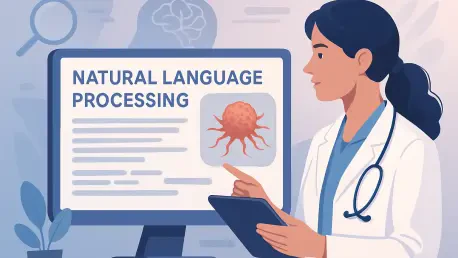In a remarkable stride forward for medical technology, natural language processing (NLP), a specialized branch of artificial intelligence, is reshaping the landscape of cancer treatment, particularly for patients grappling with brain metastases—cancers that originate elsewhere in the body and spread to the brain. A pioneering study from MUSC Hollings Cancer Center, spearheaded by Jihad Obeid, M.D., and Mario Fugal, Ph.D., and published in JCO Clinical Cancer Informatics, reveals how NLP can empower doctors by extracting critical insights from unstructured clinical notes. This innovation promises to enhance the precision of treatments like stereotactic radiosurgery (SRS), a targeted radiation therapy, by identifying the primary cancer type with unprecedented accuracy. The implications of this advancement are profound, offering hope for more personalized care and improved outcomes for patients facing one of the most challenging cancer complications. As healthcare continues to embrace data-driven solutions, this research underscores the potential of AI to bridge longstanding gaps in medical diagnostics and decision-making, setting a new standard for oncology.
Unraveling the Complexity of Brain Metastases
Brain metastases present a formidable challenge in oncology due to their diverse origins, often stemming from primary cancers in the lung, breast, skin, kidney, or digestive tract. The response to treatments like SRS varies significantly depending on the cancer’s source—lung cancer, for example, is highly sensitive to radiation and requires lower doses, while kidney cancer demands more intense, prolonged exposure. Misidentifying the primary cancer can lead to suboptimal treatment plans, risking damage to healthy brain tissue or failing to control the spread of cancer. This variability underscores the critical need for precise diagnostic information to tailor therapies effectively, ensuring that patients receive the most appropriate care without unnecessary harm.
Compounding this issue are the limitations of traditional diagnostic tools, such as International Classification of Diseases (ICD) codes, which often lack the granularity required for complex cases. These codes frequently fail to specify the primary cancer type or capture vital details like subtypes or exact locations, leading to ambiguity in treatment planning. Such gaps can delay critical interventions and hinder the ability to customize care for individual patients. The reliance on manual review of clinical notes, while rich in detail, is labor-intensive and impractical for large-scale application, highlighting a pressing need for innovative solutions that can streamline and enhance the diagnostic process in oncology.
Harnessing NLP for Precision in Cancer Diagnosis
Natural language processing emerges as a transformative tool in addressing these diagnostic challenges by enabling computers to interpret and analyze the unstructured text found in clinical notes. These documents, often filled with nuanced observations by healthcare providers, contain invaluable information that traditional coding systems overlook. The MUSC study showcases how NLP can identify key terms and patterns—such as “ductal” indicating breast cancer or “melanoma” pointing to skin cancer—to classify primary cancer types with remarkable precision. This capability allows for a deeper understanding of each patient’s condition, paving the way for more targeted and effective treatment strategies.
The effectiveness of this technology is evident in the study’s results, which tested the NLP model on over 82,000 clinical notes from 1,400 patients undergoing SRS for brain metastases. Achieving an accuracy rate of over 90% in identifying primary cancer types, the model demonstrated near-perfect classification—97%—for common cancers like lung, breast, and skin. Unlike ICD codes, it even distinguished subtypes of lung cancer, offering a level of detail previously unattainable through conventional methods. This high accuracy, validated by expert manual reviews, positions NLP as a reliable and efficient alternative, capable of transforming how diagnostic data is utilized in clinical settings to improve patient care.
Transforming Patient Care and Research with NLP
The practical benefits of NLP extend far beyond its technical achievements, significantly enhancing both clinical care and medical research. By automating the extraction of critical information from clinical notes, this technology reduces the administrative workload on healthcare providers, freeing them to focus on direct patient interaction rather than time-consuming data analysis. This efficiency translates into faster, more accurate diagnoses, enabling the development of tailored treatment plans that minimize risks such as radiation damage. For patients with brain metastases, this means a higher likelihood of receiving the right therapy at the right time, ultimately improving their quality of life and prognosis.
Equally impactful is the role of NLP in advancing research within oncology. The ability to create accurate, high-quality datasets from clinical notes opens new avenues for studying treatment outcomes and designing clinical trials. Researchers can now access detailed, reliable information that was previously buried in unstructured text, accelerating discoveries and innovations in cancer care. Furthermore, the lightweight design of the NLP model, which requires minimal computing resources, ensures its scalability across diverse healthcare environments. This accessibility makes it a feasible option for hospitals with limited budgets, broadening the potential to implement data-driven solutions on a global scale and fostering equity in medical advancements.
Looking Ahead: Broader Applications and Ethical Safeguards
The potential of NLP in healthcare extends well beyond its current application to brain metastases, with researchers already exploring additional uses that could further revolutionize patient care. One promising avenue is identifying risks such as radiation necrosis, a severe side effect of excessive radiation exposure, which could help prevent life-threatening complications. Expanding the model to other cancer types or integrating it with diverse data sources like imaging scans or lab results also holds significant promise for enhancing diagnostic and therapeutic precision. Such developments could create a more comprehensive approach to cancer management, addressing a wider range of challenges faced by patients and clinicians alike.
Equally important are the ethical and operational considerations embedded in the design of this NLP tool. Unlike larger, more complex AI systems that may pose privacy risks or require substantial infrastructure, this model prioritizes simplicity and efficiency, minimizing such concerns. Its user-friendly nature ensures that it can be adopted without extensive training or resources, making it a practical solution for widespread use in varied healthcare settings. By balancing cutting-edge innovation with ethical safeguards, this technology sets a precedent for responsible AI integration in medicine, ensuring that advancements prioritize patient safety and data security while pushing the boundaries of what is possible in cancer treatment.
Paving the Path for Future Innovations
Reflecting on the strides made, the groundbreaking work by MUSC Hollings Cancer Center researchers showcases how natural language processing reshapes the approach to treating brain metastases through precise data extraction from clinical notes. The technology’s ability to outperform traditional ICD codes with over 90% accuracy marks a turning point in delivering personalized care via stereotactic radiosurgery. It alleviates systemic burdens like manual data review, allowing medical teams to prioritize patient well-being over paperwork. Looking forward, the focus should shift to scaling this tool across more healthcare facilities, ensuring even smaller institutions can harness its benefits. Collaborative efforts between tech developers and medical professionals will be key to refining and expanding its applications, potentially integrating it with emerging diagnostic technologies. Exploring partnerships to fund and implement these solutions globally could address disparities in cancer care, while continuous evaluation of ethical implications will maintain trust and efficacy in AI-driven healthcare advancements.









